I have read a lot of posts about turkeys having respiratory problems and a couple posts about wry neck in turkeys, so I decided to compile information about my Tom Turkey's medical issues and what I did, so that in the future, if newcomers or anyone else has this same problem, they can read this to see what I did. I am not an expert in the area of turkeys. I have only experienced a few illnesses, so I can only write about what has worked for my Tom.
As some of you know, I have been dealing with my Bourbon Red Tom and his wry neck for a few weeks now. This is exhausting.
 To update those of you who may not know about my story here goes.
To update those of you who may not know about my story here goes.
This is my Tom's second go around with a respiratory infection. He had his first respiratory infection about 15 months ago. My tom is about 4 years old.
In 2009, I learned that my tom had a respiratory problem when I came home one day and his neck was twisted. See pics below;
2009 Respiratory problems with Wry Neck

2009 Respiratory problems with Wry Neck

When I noticed this, I logged on to BYC for help and I was given a lot of information. After catching my Tom, I noticed (heard) that he had a respiratory problem. When he breathed, I could hear his chest rattling. His breath smelled terrible. It had the same smell that a person would have if they had a bad sinus infection. I immediately removed him from the rest of the birds, so that he could not spread this illness to the others. I brought him inside and placed him in the laundry room on puppy pads and sheets. I kept him warm. The list below are the symptoms that he had.
Symptoms:
1. Cold like symptoms
2. Crust around the eyes and nostril area
3. Rattling of the chest inside when breathing
4. Loss of appetite
5. Roosting on low ground and not high above ground
6. Droopy wings
7. Ruffled feathers
8. Diarrhea (liquid poop)
9. Swollen Eyes
Treatment:
1. Tylan 50 - 1 - 2 cc's each day (twice a day) for 3 weeks. The first time my Tom had this problem, I gave him an injection in the breast area. But after learning from other experts about the effects of injections in the muscle, I switched to just squirting the meds in his mouth.
2. Enfamil Poly-Vi-sol Essential vitamins for infants and Toddlers (it's in a purple and gold box) in a syring and squirted it in his mouth twice a day.
3. Pedialyte or Gatorade - squirted it in his mouth twice a day. (The reason for the Pedialyte or Gatorade was to get the electrolytes in him for energy.)
4. Hand fed cooked eggs, mashed potatoes and grits twice a day.
5. Squirted water after each meal and as often as possible.
After 2 - 3 days of starting this treatment, my Tom was almost back to normal. I didn't stop the medication treatment. I kept it going for 3 weeks. Once he was eating on his own, I stopped hand feeding him. Once I knew that the respiratory problems were gone, I placed him with the rest of the flock. After the 3 weeks, the respiratory problem was gone along with the wry neck. His neck straightened out and he was back to his old self. He was roosting high on his fence again.
Well, about 15 months after this problem, the same problem returned. I returned home one day and I did not see him. I walked around the property and I found him face down in the back of the chicken yard. I thought he was dead. I called his name and he jumped up and began to run but he couldn't. He was stumbling around. I immediately picked him up and brought him inside. I listened to his breathing and smelled his breath and lo and behold, the respiratory problem was back. At that time he did NOT have wry neck. There were no visible problems that I saw that would have alerted me to this problem. The respiratory problem returned when we had freezing temperatures. Some nights were 19 degrees. I think that his problem returned because of the cold weather.
Once again, I began the same treatment/medication plan as I listed above. This time the respiratory problem was a little stubborn and it took a little longer to clear. It took about 2 weeks for it to clear. After the problem cleared in 2 weeks and he was eating on his own, I placed him back with the rest of the flock. A few days after placing him back in the chicken yard, the wry neck appeared. I didn't know what to do, so I logged on to BYC and the turkey experts told me what to do.
They suggested the following:
1. Vitamin E with Selenium soft gel tabs
I purchased the soft gel tabs. I cut off the tips of 2 gel tabs and drizzled the liquid on a piece of bread and opened up my Tom's mouth and placed the bread in his mouth. I did this twice a day. I also continued the Enfamil Poly-Vi-sol Essential vitamins for infants and Toddlers twice a day. As of right now, I continue to administer the Vitamin E with selenium in addition to the Vitamins.
The Wry Neck is VERY hard to shake. It's been 3 weeks and he still has wry neck. Although it is improving, it's still there. He eats and drinks on his own. Poop is good and no respiratory problem. He is also roosting high above ground, which is a sign to me that he is feeling better.
I have posted pics below of what his Wry Neck looks like today 3-13-2011.
3-13-2011

3-13-2011

3-13-2011

3-13-2011

3-13-2011

I should add that none of my other turkeys have experienced anything like this. No other turkeys have ever been sick or had any illnesses. He is the only one. I also don't think that this could be a neck injury because there are no other animals out in the yard that are bigger and stronger than he is and I can't imagine them injuring him. And I know this is not an injury from a predator because I don't have predator problems.
I will update this post as often as I can and as his problem changes (for better or for worst). I hope his problem gets better soon. I don't like seeing my boy with his neck that way.
I hope that this information may help someone else.
*****************************************************************************************************************************************
UPDATE: Vet's visit on 3-9-2011 and information.
Finally found an Avian vet that treats turkeys, chickens and peacocks. This is what he said about my turkeys respiratory problems and wry neck.
Before going to the vet, I emailed him a 2 page document detailing both times my turkey had the respiratory problem and wry neck. I also sent him pics of my turkey with the twisted neck. I wanted him to know beforehand what he would be dealing with. I collected a fresh sample of poop so that he could test the poop.
Well, the bet came in the waiting room and completed a physical exam on my turkey. He swabbed his mouth for testing. I gave him the sample of poop in the ziploc bag that I collected. We talked about the 2 episodes of the respiratory problems and wry neck. He explained that the respiratory problem is viral and can be spread to other turkeys. He also said that the respiratory problem is what caused the wry neck. My turkey also had what I thought was a cataract in his eye but the vet explained that the white spot was a lesion that was caused my the respiratory problem . As the respiratory problem when away, so did the white spot in my turkeys' right eye. He asked me how many other turkeys did I have and did they also get a respiratory problem and wry neck. I told him no. I explained to him that once I noticed that my turkey had a respiratory problem, that I immediately removed my turkey from ALL of the other animals, including the turkeys. What he said next shocked me. He said that it didnt matter if I had removed him immediately from the flock because the respiratory problem would have already spread to the other animals. He explained that a respiratory problem is a silent disease and an animal can have it for days and possibly die before an owner would know that their animal is sick. He said that my turkey could have had the respiratory problem for days before I even knew it. (This explains why so many people on the BYC turkey thread have posted that their turkeys were dead in just a few days after the owner noticed that something was wrong with their turkey. They didnt know that their poor turkey was sick.) He said that if my other turkeys have never had a respiratory problem or wry neck, then they are probably immuned to the virus and will never get it.
The vet went on to say a respiratory problem can be recurring. He said that it was a good thing that I was able to treat the 1st case of the problem 16 months ago and the my turkeys neck straightened out. He said if a bird has wry neck longer than 3 weeks, then it is highly likely that the bird will NOT get rid of the wry neck. He said that the neck muscles tense up in that twisted position and stays that way.
He said the wry neck in my turkey is most likely permanent being as though he has had it for more than 3 weeks. He said that my turkey can live a normal life with wry neck. He asked me was my turkey eating. I told him yes because I see my turkey eating and drinking every day. He told me that my turkey felt as if he could have lost weight. They weighed him and he was ONLY 20 lbs. That is SKIINNY for MY turkey. He said that my turkey is probably putting his head down in the feeder to get food but he is not coming up with much food. He said that he was probably getting just enough food to live. His suggestions was for me to raise my turkeys feeder and waterer to his eye level, so that he does not have far to go down to eat and drink.
He said that there are not too many antibiotics for this problem but he prescribed Baytril 136 mg. He gave me 7 pills to be given 1 tablet daily by mouth for 7 days to treat the infection. He said that he wants to see if there will be any change in my turkey. After the 7 days of treatment, to call him on Friday to let him know the status of my turkey. He went on to say that the swab test and poop sample showed no signs of any problem. All tests were good.
When we got home, I gave my turkey his meds. I had to dissolve 1 of the tablets in water until fully dissolved. The tablet is HUGE. It looks like a BIG HORSE PILL. It was a lot of stirring and a lot of crushing the tablet. It took about 15 minutes before it was totally dissolved. After dissolving the tablet, I used the syringe that the vet gave to me and sucked up the dissolved tablet and squirted it in my turkeys mouth. I will do this every day and hope that maybe, just maybe his neck will straighten out. The vet didnt say that the Baytril will correct the neck. I think that he didnt want to get my hopes up in the event the meds dont work. He just said the meds are an antibiotic to make sure that if my turkey has any infections, it can be cured.
So, I am having a new feeder being built just for him and it is being measured specifically for his height. It will be raised a couple feet so that he can eat without having to lower his head so far down. His waterer will also be raised at his eye level
After the end of the medication treatment on Friday, 3-15-2011, I will post again with an update.
Well, this has been a long road to this point. All the researching and wondering about respiratory problems and wry neck, I finally was able to an Avian Vet who told me what I needed to know.
Please keep an eye on your turkeys for any sign that you think is not normal. Keep an eye to make sure that your turkey is not isolating himself or herself from the others, droopy wings, weight loss (touch and feel on your turkeys breast and other areas to check), smelly breath, ANY swelling around the eyes. As he said, this is a silent disease and if you don't catch it in time, your turkey WILL die.
*********************************************************************************************************************************
After the treatment of the Baytril on 3-15-2011, there was no change in my turkey. His neck is still twisted but he is still very healthy as he has been the last couple of months. He continues to eat, drink, run around, strut for the girls or for anyone who will look at him. And he will still roost about 4 feet in the air on his roosting board. I have raised his feeder and waterer so that he doesn't have to put his head so far down to eat. His feeder and waterer is now a couple of inches below his eye level. To be honest, I am seeing him eat a lot more than I did before when the feeder and waterer was on the ground. So the vet may have been on to something as far as suggesting that I raise my tom's feeder and waterer.
I called the vet on Friday and gave him an update. He asked for me bring in poop samples of the turkey hens. Good Luck with that. All of them are setting on eggs.
 He wants to test their poop to see if they are testing positive for anything. I don't think that they will test positive because they have never been sick and have never had any symptons of anything. I"ll see what I can do.
He wants to test their poop to see if they are testing positive for anything. I don't think that they will test positive because they have never been sick and have never had any symptons of anything. I"ll see what I can do.
I have read on another thread that someone had a chicken who had wry neck and they gave their chicken Prednisone. I have researched and found that Prednisone is a steroid and it treats inflammatory diseases. A few people think that wry neck is just that. I have to do some more research and also talk to the vet about this.
I will continue to update on this thread with more information for others to learn as I am learning. I hope that I can help someone with their turkey as all of this is somehow helping my turkey.
**********************************************************************************************************************************
UPDATE FOR 7-1-2011 - STATE TESTING
I just wanted to update everyone on my Bourbon Red Tom Turkey. For those of you who are aware, I have been dealing with a situation with my Tom for a while now, so I decided to contact the State for help.
I had contacted the State Vet who did my NPIP testing and asked him if he could come out and draw some blood and send the blood to the state lab and have my turkey's blood tested for ANY and EVERYTHING. When I say this, I am referring to having my turkey's blood tested for Mycoplasma Gallisepticum (MG), Avian Influenza, Fowl Cholera, etc.
Well, after we were able to arrange our schedules, he came out and took blood. This blood was sent to the Sate lab and tested.
I received the results today and the results are NEGATIVE. They could not find anything wrong with my turkey. All blood work was great. He has ABSOLUTELY no diseases of any kind, which I was already pretty sure of that because no other animals have been or are affected. WHEW !!!!!!!
The state also sent my turkey's info (past problems) along with pictures of my turkey's twisted neck to a Doctor of Vet Medicine and Master of Avian Medicine at a Poultry Disease and Research Center at at a University in another state and his opinion was that this (the twisted neck) may have been a traumatic injury and the respiratory issues a result of poor air flow. He does not think that is related to any viral or bacteria issues.
I asked about Prednisone because I have read that Prednisone helps wry neck and he said that steroids could be used to alleviate any discomfort as far as the neck is concerned. However (which I already knew), the steroids would weaken my turkey's immune system. So, I won't go that route.
Well, I'm relieved to know that this matter was handled by the State who is trained on testing for diseases, so if anything was wrong with my turkey, the blood results would have showed problems but it didn't.
I know that our animals don't live forever, so in the event my turkey goes to turkey heaven, I will have a necropsy done on my boy so that I will know more about what could have caused his twisted neck.
I can't wait to get home to give the good news to my handsome turkey. He will be so excited to hear this.
Thanks to all of you who checked in on him from time to time and asked me about him. I appreciate that.
As some of you know, I have been dealing with my Bourbon Red Tom and his wry neck for a few weeks now. This is exhausting.

This is my Tom's second go around with a respiratory infection. He had his first respiratory infection about 15 months ago. My tom is about 4 years old.
In 2009, I learned that my tom had a respiratory problem when I came home one day and his neck was twisted. See pics below;
2009 Respiratory problems with Wry Neck
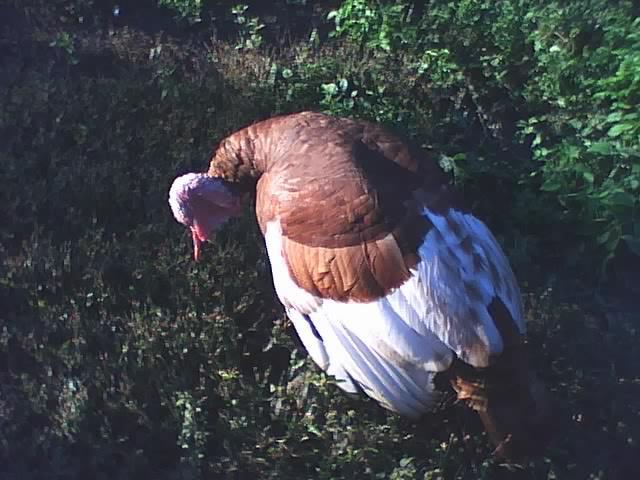
2009 Respiratory problems with Wry Neck
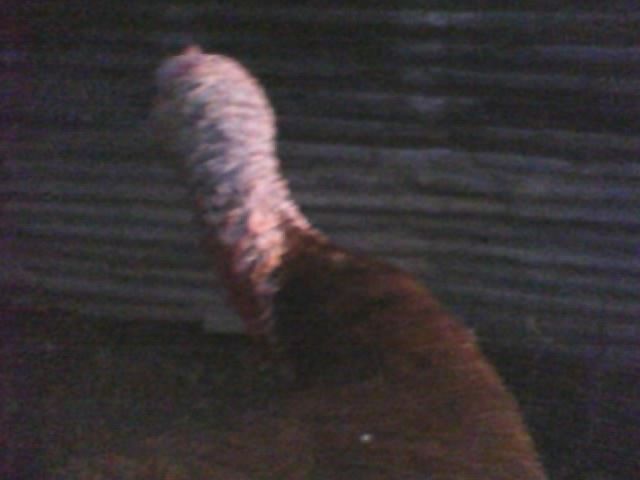
When I noticed this, I logged on to BYC for help and I was given a lot of information. After catching my Tom, I noticed (heard) that he had a respiratory problem. When he breathed, I could hear his chest rattling. His breath smelled terrible. It had the same smell that a person would have if they had a bad sinus infection. I immediately removed him from the rest of the birds, so that he could not spread this illness to the others. I brought him inside and placed him in the laundry room on puppy pads and sheets. I kept him warm. The list below are the symptoms that he had.
Symptoms:
1. Cold like symptoms
2. Crust around the eyes and nostril area
3. Rattling of the chest inside when breathing
4. Loss of appetite
5. Roosting on low ground and not high above ground
6. Droopy wings
7. Ruffled feathers
8. Diarrhea (liquid poop)
9. Swollen Eyes
Treatment:
1. Tylan 50 - 1 - 2 cc's each day (twice a day) for 3 weeks. The first time my Tom had this problem, I gave him an injection in the breast area. But after learning from other experts about the effects of injections in the muscle, I switched to just squirting the meds in his mouth.
2. Enfamil Poly-Vi-sol Essential vitamins for infants and Toddlers (it's in a purple and gold box) in a syring and squirted it in his mouth twice a day.
3. Pedialyte or Gatorade - squirted it in his mouth twice a day. (The reason for the Pedialyte or Gatorade was to get the electrolytes in him for energy.)
4. Hand fed cooked eggs, mashed potatoes and grits twice a day.
5. Squirted water after each meal and as often as possible.
After 2 - 3 days of starting this treatment, my Tom was almost back to normal. I didn't stop the medication treatment. I kept it going for 3 weeks. Once he was eating on his own, I stopped hand feeding him. Once I knew that the respiratory problems were gone, I placed him with the rest of the flock. After the 3 weeks, the respiratory problem was gone along with the wry neck. His neck straightened out and he was back to his old self. He was roosting high on his fence again.
Well, about 15 months after this problem, the same problem returned. I returned home one day and I did not see him. I walked around the property and I found him face down in the back of the chicken yard. I thought he was dead. I called his name and he jumped up and began to run but he couldn't. He was stumbling around. I immediately picked him up and brought him inside. I listened to his breathing and smelled his breath and lo and behold, the respiratory problem was back. At that time he did NOT have wry neck. There were no visible problems that I saw that would have alerted me to this problem. The respiratory problem returned when we had freezing temperatures. Some nights were 19 degrees. I think that his problem returned because of the cold weather.
Once again, I began the same treatment/medication plan as I listed above. This time the respiratory problem was a little stubborn and it took a little longer to clear. It took about 2 weeks for it to clear. After the problem cleared in 2 weeks and he was eating on his own, I placed him back with the rest of the flock. A few days after placing him back in the chicken yard, the wry neck appeared. I didn't know what to do, so I logged on to BYC and the turkey experts told me what to do.
They suggested the following:
1. Vitamin E with Selenium soft gel tabs
I purchased the soft gel tabs. I cut off the tips of 2 gel tabs and drizzled the liquid on a piece of bread and opened up my Tom's mouth and placed the bread in his mouth. I did this twice a day. I also continued the Enfamil Poly-Vi-sol Essential vitamins for infants and Toddlers twice a day. As of right now, I continue to administer the Vitamin E with selenium in addition to the Vitamins.
The Wry Neck is VERY hard to shake. It's been 3 weeks and he still has wry neck. Although it is improving, it's still there. He eats and drinks on his own. Poop is good and no respiratory problem. He is also roosting high above ground, which is a sign to me that he is feeling better.
I have posted pics below of what his Wry Neck looks like today 3-13-2011.
3-13-2011
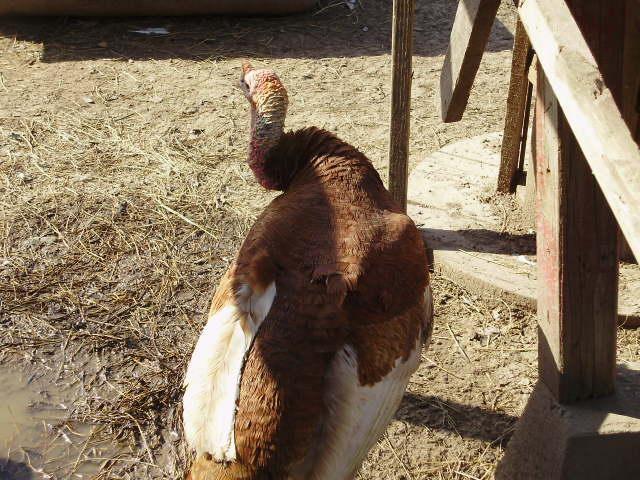
3-13-2011
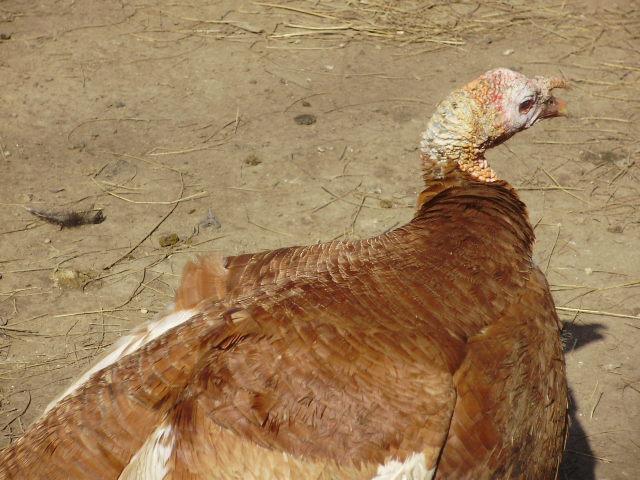
3-13-2011
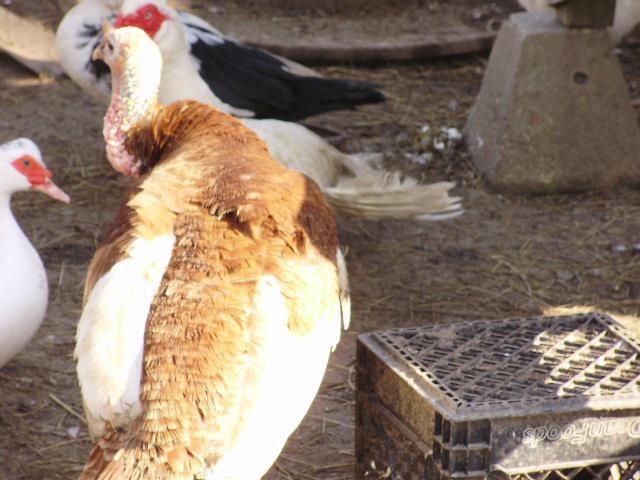
3-13-2011
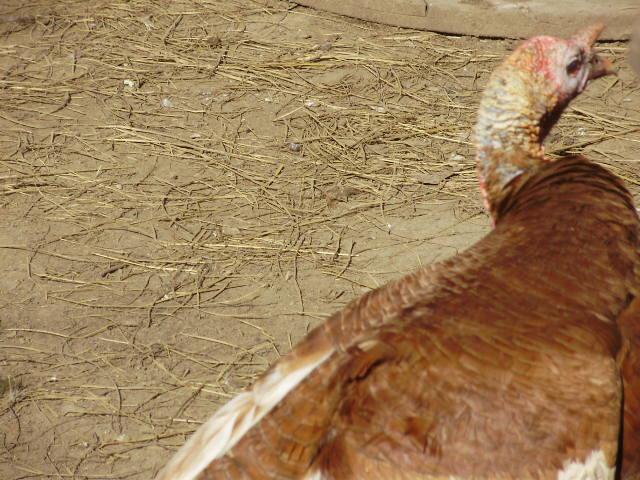
3-13-2011
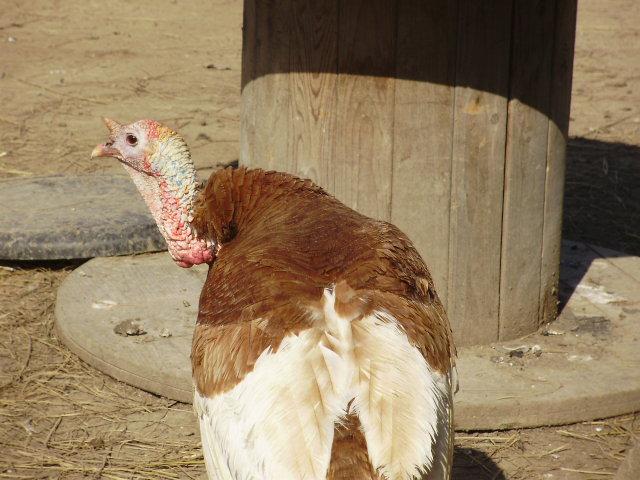
I should add that none of my other turkeys have experienced anything like this. No other turkeys have ever been sick or had any illnesses. He is the only one. I also don't think that this could be a neck injury because there are no other animals out in the yard that are bigger and stronger than he is and I can't imagine them injuring him. And I know this is not an injury from a predator because I don't have predator problems.
I will update this post as often as I can and as his problem changes (for better or for worst). I hope his problem gets better soon. I don't like seeing my boy with his neck that way.
I hope that this information may help someone else.
*****************************************************************************************************************************************
UPDATE: Vet's visit on 3-9-2011 and information.
Finally found an Avian vet that treats turkeys, chickens and peacocks. This is what he said about my turkeys respiratory problems and wry neck.
Before going to the vet, I emailed him a 2 page document detailing both times my turkey had the respiratory problem and wry neck. I also sent him pics of my turkey with the twisted neck. I wanted him to know beforehand what he would be dealing with. I collected a fresh sample of poop so that he could test the poop.
Well, the bet came in the waiting room and completed a physical exam on my turkey. He swabbed his mouth for testing. I gave him the sample of poop in the ziploc bag that I collected. We talked about the 2 episodes of the respiratory problems and wry neck. He explained that the respiratory problem is viral and can be spread to other turkeys. He also said that the respiratory problem is what caused the wry neck. My turkey also had what I thought was a cataract in his eye but the vet explained that the white spot was a lesion that was caused my the respiratory problem . As the respiratory problem when away, so did the white spot in my turkeys' right eye. He asked me how many other turkeys did I have and did they also get a respiratory problem and wry neck. I told him no. I explained to him that once I noticed that my turkey had a respiratory problem, that I immediately removed my turkey from ALL of the other animals, including the turkeys. What he said next shocked me. He said that it didnt matter if I had removed him immediately from the flock because the respiratory problem would have already spread to the other animals. He explained that a respiratory problem is a silent disease and an animal can have it for days and possibly die before an owner would know that their animal is sick. He said that my turkey could have had the respiratory problem for days before I even knew it. (This explains why so many people on the BYC turkey thread have posted that their turkeys were dead in just a few days after the owner noticed that something was wrong with their turkey. They didnt know that their poor turkey was sick.) He said that if my other turkeys have never had a respiratory problem or wry neck, then they are probably immuned to the virus and will never get it.
The vet went on to say a respiratory problem can be recurring. He said that it was a good thing that I was able to treat the 1st case of the problem 16 months ago and the my turkeys neck straightened out. He said if a bird has wry neck longer than 3 weeks, then it is highly likely that the bird will NOT get rid of the wry neck. He said that the neck muscles tense up in that twisted position and stays that way.
He said the wry neck in my turkey is most likely permanent being as though he has had it for more than 3 weeks. He said that my turkey can live a normal life with wry neck. He asked me was my turkey eating. I told him yes because I see my turkey eating and drinking every day. He told me that my turkey felt as if he could have lost weight. They weighed him and he was ONLY 20 lbs. That is SKIINNY for MY turkey. He said that my turkey is probably putting his head down in the feeder to get food but he is not coming up with much food. He said that he was probably getting just enough food to live. His suggestions was for me to raise my turkeys feeder and waterer to his eye level, so that he does not have far to go down to eat and drink.
He said that there are not too many antibiotics for this problem but he prescribed Baytril 136 mg. He gave me 7 pills to be given 1 tablet daily by mouth for 7 days to treat the infection. He said that he wants to see if there will be any change in my turkey. After the 7 days of treatment, to call him on Friday to let him know the status of my turkey. He went on to say that the swab test and poop sample showed no signs of any problem. All tests were good.
When we got home, I gave my turkey his meds. I had to dissolve 1 of the tablets in water until fully dissolved. The tablet is HUGE. It looks like a BIG HORSE PILL. It was a lot of stirring and a lot of crushing the tablet. It took about 15 minutes before it was totally dissolved. After dissolving the tablet, I used the syringe that the vet gave to me and sucked up the dissolved tablet and squirted it in my turkeys mouth. I will do this every day and hope that maybe, just maybe his neck will straighten out. The vet didnt say that the Baytril will correct the neck. I think that he didnt want to get my hopes up in the event the meds dont work. He just said the meds are an antibiotic to make sure that if my turkey has any infections, it can be cured.
So, I am having a new feeder being built just for him and it is being measured specifically for his height. It will be raised a couple feet so that he can eat without having to lower his head so far down. His waterer will also be raised at his eye level
After the end of the medication treatment on Friday, 3-15-2011, I will post again with an update.
Well, this has been a long road to this point. All the researching and wondering about respiratory problems and wry neck, I finally was able to an Avian Vet who told me what I needed to know.
Please keep an eye on your turkeys for any sign that you think is not normal. Keep an eye to make sure that your turkey is not isolating himself or herself from the others, droopy wings, weight loss (touch and feel on your turkeys breast and other areas to check), smelly breath, ANY swelling around the eyes. As he said, this is a silent disease and if you don't catch it in time, your turkey WILL die.
*********************************************************************************************************************************
After the treatment of the Baytril on 3-15-2011, there was no change in my turkey. His neck is still twisted but he is still very healthy as he has been the last couple of months. He continues to eat, drink, run around, strut for the girls or for anyone who will look at him. And he will still roost about 4 feet in the air on his roosting board. I have raised his feeder and waterer so that he doesn't have to put his head so far down to eat. His feeder and waterer is now a couple of inches below his eye level. To be honest, I am seeing him eat a lot more than I did before when the feeder and waterer was on the ground. So the vet may have been on to something as far as suggesting that I raise my tom's feeder and waterer.
I called the vet on Friday and gave him an update. He asked for me bring in poop samples of the turkey hens. Good Luck with that. All of them are setting on eggs.

I have read on another thread that someone had a chicken who had wry neck and they gave their chicken Prednisone. I have researched and found that Prednisone is a steroid and it treats inflammatory diseases. A few people think that wry neck is just that. I have to do some more research and also talk to the vet about this.
I will continue to update on this thread with more information for others to learn as I am learning. I hope that I can help someone with their turkey as all of this is somehow helping my turkey.
**********************************************************************************************************************************
UPDATE FOR 7-1-2011 - STATE TESTING
I just wanted to update everyone on my Bourbon Red Tom Turkey. For those of you who are aware, I have been dealing with a situation with my Tom for a while now, so I decided to contact the State for help.
I had contacted the State Vet who did my NPIP testing and asked him if he could come out and draw some blood and send the blood to the state lab and have my turkey's blood tested for ANY and EVERYTHING. When I say this, I am referring to having my turkey's blood tested for Mycoplasma Gallisepticum (MG), Avian Influenza, Fowl Cholera, etc.
Well, after we were able to arrange our schedules, he came out and took blood. This blood was sent to the Sate lab and tested.
I received the results today and the results are NEGATIVE. They could not find anything wrong with my turkey. All blood work was great. He has ABSOLUTELY no diseases of any kind, which I was already pretty sure of that because no other animals have been or are affected. WHEW !!!!!!!
The state also sent my turkey's info (past problems) along with pictures of my turkey's twisted neck to a Doctor of Vet Medicine and Master of Avian Medicine at a Poultry Disease and Research Center at at a University in another state and his opinion was that this (the twisted neck) may have been a traumatic injury and the respiratory issues a result of poor air flow. He does not think that is related to any viral or bacteria issues.
I asked about Prednisone because I have read that Prednisone helps wry neck and he said that steroids could be used to alleviate any discomfort as far as the neck is concerned. However (which I already knew), the steroids would weaken my turkey's immune system. So, I won't go that route.
Well, I'm relieved to know that this matter was handled by the State who is trained on testing for diseases, so if anything was wrong with my turkey, the blood results would have showed problems but it didn't.
I know that our animals don't live forever, so in the event my turkey goes to turkey heaven, I will have a necropsy done on my boy so that I will know more about what could have caused his twisted neck.
I can't wait to get home to give the good news to my handsome turkey. He will be so excited to hear this.
Thanks to all of you who checked in on him from time to time and asked me about him. I appreciate that.
Last edited:


